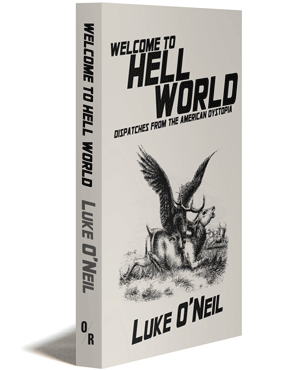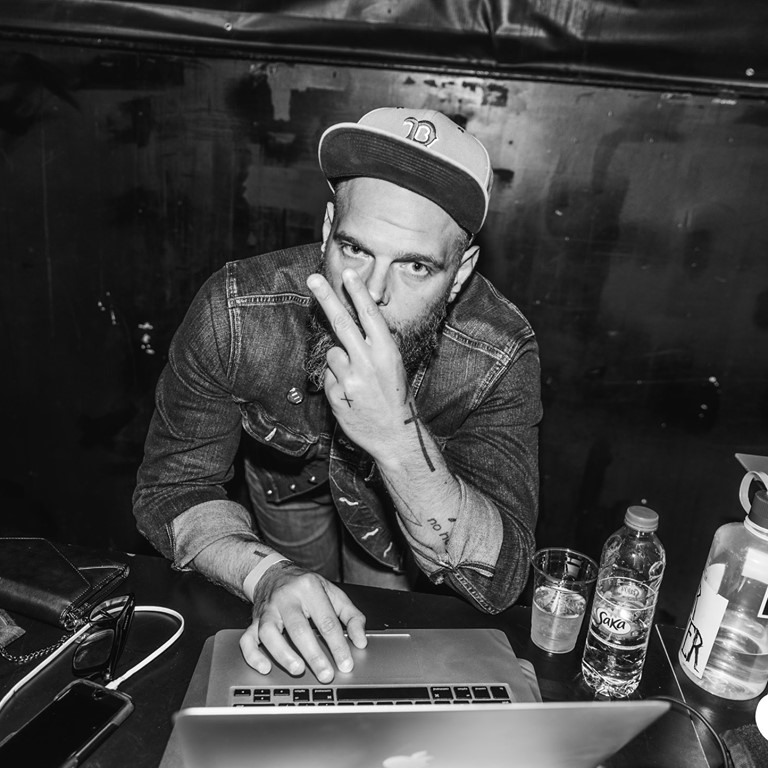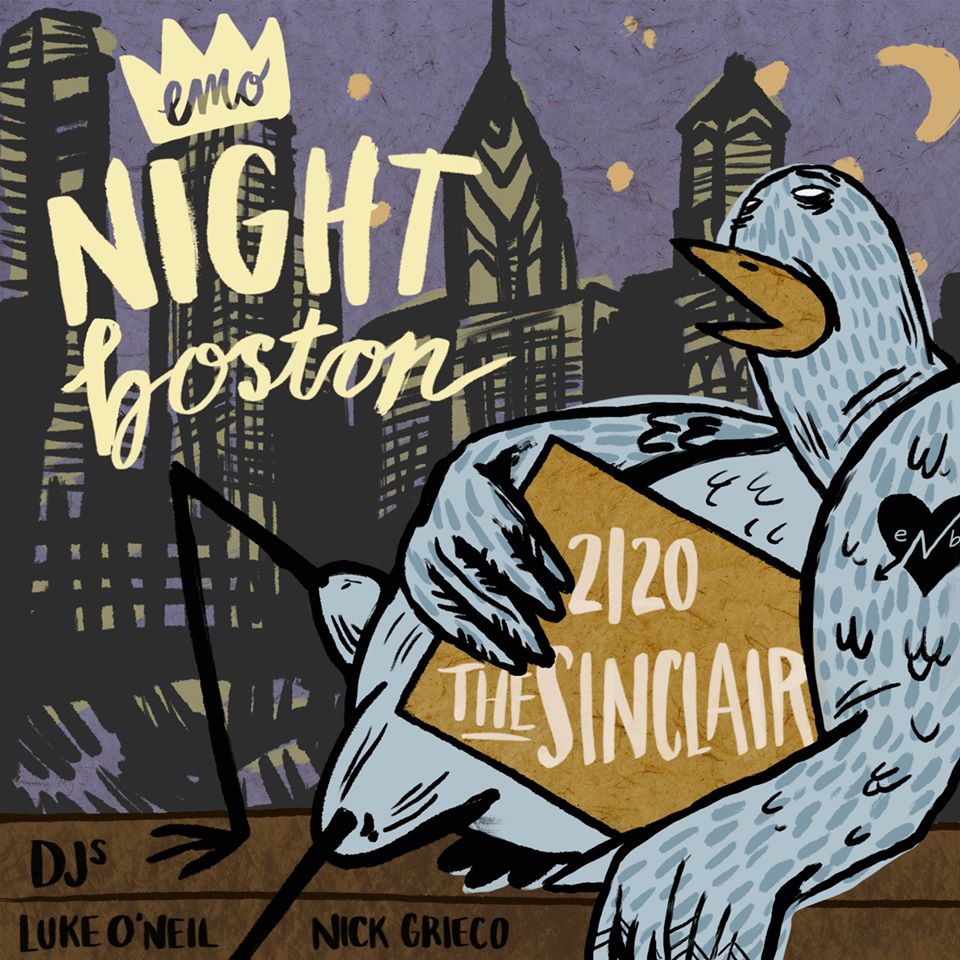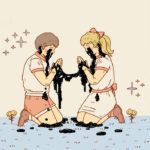Interview: Luke O’Neil Author of ‘Hell World’
Posted: by admin

Luke O’Neil is one of my favorite writers and journalists. I guess that’s not a mainstream pick because he hasn’t written any famous novels or won any big journalism awards (yet), but he has gotten hate from the MAGA chuds because he wrote that people should piss in Republicans’ food in a major city’s newspaper, so I think that’s equivalent as far as I’m concerned.
Luke is a longtime writer about issues in social justice, criminal justice, financial inequality, and American war crimes. Occasionally his articles are featured in big outlets like (insert corporation #1) and (insert corporation #2), but more recently he has been writing a weekly newsletter called Welcome to Hell World which presents stories and research about the many different issues and injustices that make living in America in the 2020’s such a hellscape, and delivering it direct to his readers himself. Just a few months ago, he compiled the best of the first batch of newsletters into a truly touching and emotional read of a book, which is also hilarious in the dark humor sort of way that the title, Welcome To Hell World, illustrates.
Importantly, in all of his writing, Luke tells it like it is. He is not afraid to take to task the establishment gatekeepers of the world, whether they be police chiefs, democratic politicians, the corporate heads of his own industry, or just your standard Republican bootlickers. It’s that honesty, along with pure writing ability, creativity, and a heavy helping of empathy, that makes Luke’s writing so special. I talked to him recently about his newsletter and his decision to distance himself from the corporate journalism world, and also some other important issues like radical centrism, the dangers of “hearing both sides” and whether The Deftones make for good writing music.
Take a read through this interview, and then subscribe to the newsletter and buy his new book.

Henderson: I’ve been reading the book and I’m a big fan of your writing and newsletter, so I figured we could do a few questions about the newsletter, writing in general, and music and see how it goes. I’m sure you’ve been on the other end of this one hundred million times.
Luke: It’s weird, I’ve been interviewed a bunch over the course of my life, and obviously a lot more with the book, and it’s awkward to talk about yourself. I finally have a lot more sympathy for a lot of the people that I’ve interviewed over the years. It’s like this balance where you don’t want to seem cocky, but you also want to tell people that do deserve a little attention, but there’s a fine line to walk. You don’t want to seem like a shithead.
To start, I was wondering what made you want to do this particular newsletter about these topics (legal injustice, climate change, the horrors of capitalism, US foreign policy), because in your book you talk about how you didn’t want to go to your editors and have to ask to write about certain things, but were these the topics that you’ve always wanted to write about, and now you just now have the ability to?
In a way. I spent a lot of time early in my career doing arts and entertainment reporting in my 20s and early 30s. I wasn’t really doing hard hitting political stuff. I think that because I was such an obsessive music guy, I’d always thought I was just going to be a music journalist, and I was for a long time.
Then about 6 years ago, I started getting the opportunity to start covering more national political topics in Esquire and couple of other places, and I think it was after so long of writing about music and other arts and entertainment stuff, that I just started thinking it was so pointless and it didn’t matter, and I hated it, and it was really nice to be able to write about stuff that might actually matter in the world.
I still love music but just doing it for so long, I ran out of things to say about bands and ran out of questions to ask. Not to mention that the way music was covered about 10 years ago, started to change. It became so superficial and like everything else in the media, nowhere would really let you write about unheard of bands and they all had to have like a Beyoncé or Kanye take to it or something, especially at some of the bigger national outlets that I was writing for, and I didn’t want to do that.
Then, like a lot of other people, around 2015, my brain started to melt because of the political cycle, and I just couldn’t stop thinking about a lot of these issues that I was reading about. So it was really nice to be able to just see something that was terrible going on and to be able to call it what it was. A lot of times you have to censor yourself if you’re writing for a big outlet, you can’t literally just say “This is fucking terrible. These people are vampire ghouls and they deserve to die”, you know? They don’t tend to let you say that shit in like the Washington Post or Esquire or whatever, so it was just like a great unburdening that I can actually say whatever I want, and I don’t have to ask permission for anybody.
Wow that’s so relateable what you said about having to ask permission and how the music industry wasn’t letting you write about you stuff years ago, because that’s exactly when I started to get into music writing. I interned at MTV, and they wouldn’t let me write about anything good. It was Bieber who was the big thing at the time, and that was why I started The Alternative because I was like, if I’m going to do this work, I’m going to at least write about the things that I want to write about.
Yeah, for sure. I did a couple of years at MTV writing for them too. Weirdly, MTV actually did let me write about some cool stuff, which is ruining the narrative here, but that happened to coincide with a couple years where they were trying to do cool stuff. So, they let me write about The Wonder Years and shit like that and Turnover, then that ended.
Every once in a while, they’ll do something cool, and remind you what MTV once was.
But I’ve talked to other journalists a bit about this too, and one thing that they talk about is that they are preached that they should always be neutral and they should be conveying information from a dispassionate position, especially at bigger sites. And basically, I feel like that doesn’t exist, and that’s one thing that comes through in your writing as well: you don’t try to see both sides, because almost all the time, there isn’t really two sides. There’s one side that’s completely in the wrong.
Yeah, I mean there’s obviously lots of complicated issues, but by and large there’s a good guy and a bad guy, and it’s infuriating that traditional journalism doesn’t let you say that.
I don’t know if I want to call myself a journalist anymore, just because I’m so disheartened with the profession. To be sure there’s tons of people out there that are doing amazing journalism, like I love the site, ProPublica. I feel like the type of stuff they’re doing is so inspiring and awesome, but they’re doing it from a perspective where the criminal justice system is a fucking nightmare and they call it as such, and you can’t really do that in the New York Times or Washington Post or wherever. You have to pretend that there’s two sides to every given story, and I think that’s does a real disservice to people. Especially, on CNN and MSNBC, they do it all the time too, and it’s not to say that I can crack the code or something, it’s just that this feels like a form of lying to people.
Never mind the fact that first of all, being unbiased is a lie. There’s no such thing. This idea of centrism that MSNBC and CNN do is actually radical centrism. It’s such bullshit that they get to pretend that centrism isn’t a political stance. Staking yourself out in the middle is in fact political. It’s a choice that you make, and it’s no less biased than coming at things from a left or right bias.

Photo by Adam Parshall
Definitely in agreement over here. Keeping things the same is a conscious choice and a crazy one considering the circumstances we are in. People tend to think, “Oh, I don’t want to go to the right. I don’t want to go to the left.” , but if you choose to keep things how they are, even after seeing how many things are going wrong, that’s a pretty radical choice in itself.
One thing in your writing throughout this book and newsletter, is that there are so many different things going on, and they all kind of semi-relate to each other, mixed with stories from your life, and it’s all pretty stream of conscious, and I’m a big fan of that writing style myself, how did you develop that?
I was in a lot of creative writing classes in college and grad school, and I always thought I was going to write poetry or short stories and things like that, so I’ve always been a fan of that sort of that style and in particular, a lot of postmodern short story writers. So that was always something that I had had inside of me, but again, you can’t write like that at these bigger outlets. You have to write clear sentences; you can’t use that voice. I was trying to point out the absurdity of any given political situation I’m writing about with humor and a lot of times the places I would write for would edit those out. They would think people wouldn’t get it.
So, the stream of consciousness stuff was always in the back of my mind, and around a year and a half ago, I read this book Cherry by Nico Walker, and it wasn’t quite like my writing style, but it was this affectation that he used in his writing about some real serious shit like addiction and being at war in Iraq and Afghanistan. It really sort of lit something on fire in my brain and made me want to write my own version of that.
I feel like it works in a way too. Described in the simplest terms, it’s what my brain is like when I’m looking at the news for 12 hours a day. I’ve tried to transcribe that into writing as closely as possible because when you are a person reading a story in the news, or watching a TV show, unless it’s like the most gripping thing, our brains tend to wander a little bit. So, reading some story you might think “Oh, that reminds me of something else”, and why not just insert those diversions? Why not just include that? And for some reason it seems people really like how that that makes them feel.
I’d compare it to Twitter which hammers us with 30 things at once. That is kind of how our brains are wired, at least younger people who are on the internet, it’s just kind of become the way we approach news. So, when you move around it’s an interesting way to tell stories about your life and about other people’s lives, while also getting to serious issues. When I was reading the book, the intensity of the stories is a lot to absorb, these stories that are terrifying, so sometimes you need you need a little diversion.
Yeah, its a release of a pressure valve a little bit. If Hell World was just me retelling these horrible stories I’ve read or just talking to people whose lives have been fucked it wouldn’t be no fun. Nobody would want to read that. So I feel like the diversions like, ‘This healthcare crisis reminds me of this song. This poem reminded me of this time in my life when this happened.’ help to sort of smuggle in the central concept of whatever I’m trying to get through to people.
It definitely works at least most the time. Sometimes I still need a five minute break after reading a few chapters though, which brings me to my next question. When I personally write about issues like healthcare, politics, or mental health, I feel so emotionally drained, and I can imagine you doing this constantly for your newsletter takes a toll. Did you feel that as you have been working on Hell World?
I mean as you can tell from the book, I’ve had some struggles with drinking, mental health, and processing these emotions, even though I spend a decent amount of time going to therapy, but I don’t know. The way I think about it is, who gives a shit how I feel when I’m just talking to other people whose lives have been ruined or writing about other people whose lives have been ruined. The worst thing that has happened to me is that I’m kind of depressed all the time, so who am I to say that I’ve got a tough situation here.
Compared to a lot of the people that I write about in the book, I lived the life of a king. I get to write about what I want, I get to make a little bit of money off it. I don’t have to take any shit from anybody. At the same time, I’m still a middle-class guy whose life can be destroyed tomorrow if I got a $20,000 hospital bill or something. But I try to keep it in perspective, and I also try to be upfront about that in my writing. When I say my back hurts or I’m hungover, I try to make it clear that I’m not the center of the universe, even though I’m writing from my own perspective.
I think that idea also comes out of the DIY/punk ethos, or at least what people try and preach in that scene, which is self-sacrifice and do what you believe in. So, I can definitely understand, gritting your teeth and looking at the burden of writing about this stuff in perspective.
There’s an interview I do in the book with a really nice writer who happened to fall off a roof and lose the use of his limbs, and we talked about this and I was like, “I feel fucking stupid even having any problems when I’m talking to you”, and it’s in the chapter towards the end but he said that everyone has their own things, it’s not “somebody has it worse than me, so therefore, I can’t complain”.
That that is some wisdom and perspective there for sure. Your newsletter covers many different topics, so how do you make the decision what to write about for each issue, and which ones make the book?
Sometimes I worry about trying to keep a nice balance. I worry the newsletter might just turn into the ‘fuck the police newsletter’. But the truth is, there’s really no shortage of terrible things going on whether it is police violence or predatory healthcare billing or capitalist pig bosses stealing wages or the addiction and mental health stuff that I write about. Sometimes I plan them out. If it’s going to be like a recorded piece or I’m going to look at a strike or protest, or if I’m going to interview XYZ person who’s doing something cool or has had something bad happen to them, then those ones take some scheduling much like working at a regular newspaper. But to be honest, most of the other ones, and honestly most of the best ones, I just sort of wake up and I read a story in the news, and I just kind of go for it and see what happens. And sometimes that works out great. Sometimes I think maybe some of them aren’t as good as the others but I like the freedom of it.
For the book, it was hard to narrow it down because the book was like 550 pages and Hell World could easily fit 1000, just based on the stuff within one year. My publisher and editor did a great job of working with me, they’re like, ‘no, this one has to be in there or you could lose this one.’ and it was a pain in the ass process. I got so fucking sick of reading the book, I must’ve read it like five or six times just in the editing process. Next time I write a book it’s going to be a lot shorter.

Yeah, was this your first book and what was that experience like to publish a book from the newsletter?
No, I published another book at a small indie press probably seven years ago about the dive bars of Boston. I went to like 100 different dive bars and tried to tell the stories of their history. These old neighborhood places that’ve been there forever. So, this was my second one, but the only reason I did it is that the publisher was really sort of pressuring me to. I had no designs on writing book.
I sort of hated my experience writing that first book. I didn’t make any money off of it, as people tend not to do. But my new publisher just kept encouraging me that it would be great, and I thought, well I’m already writing the fucking thing I might as well just like put them together at the end.
When you try to publish a book, you have to like basically write the right the pitch and you have to shop it around and get an agent and none of that shit appealed to me. So here comes a publisher that is like ‘I already like what you’re doing and you can do it exactly the way you’re doing it without me fucking it up’. and it was sort of the dream.
I just I think there’s too many books in the world. You see all these people writing books all the time it’s on like one topic and some big publisher acquires it and maybe you get like a $30,000 advance if you’re lucky, and you spend like a year and a half on it, and then it comes and goes. Seems pointless. There’s too many books and I recognize the irony of me saying that from a guy who just published a book that probably nobody needs or wants, but I stand by it.
I think everyone who writes is like, one day I’ll write a book, but then you go to the bookstore, and there’s like, thousands of books, and it’s like do I really have anything to offer that isn’t already here. So, I can relate to that a bit as well.
With all the different stories in the book, is there any that like particularly stuck with you or you might want to revisit down the line in a future newsletter?
I’ve gone back to some of them since the book was finalized in April of last year. But one that stuck with me was one that did some good in the world. It was about a woman who couldn’t afford a heart transplant. Hell World readers and a bunch of other people helped raise like $40,000 for her. I keep in touch with her, and a month or so ago she got approved for heart transplants and so that’s one I’ve been hoping to revisit and have a happy ending for. Hopefully she’ll message me in six months or a year and say that her heart transplant worked, and everything worked out okay.
That would be incredible, and I mean if this newsletter just saves one person at least it did that. That’s a lot better than most blogging for sure.
One question that I think a lot of people who have become leftists or progressives ask each other is ‘What started you down this path to fight for these things?’, and obviously writers like you and I are both white guys that love football, so I feel like we are the target market for the right-wing opposition. So why do you started getting interested in all this to the point where you ended up becoming an activist for these issues?
I think its partly because I come from a pretty fucked up family background, but one that stabilized later in my life. I come from addiction and abuse and a broken family and all that shit that happens when you’re poor, but then my teen years I had a stepfather that sort of stabilized everything so I kind of had both sides of the picture in my youth. Knowing what sort of desperation is like but also knowing what middle class comfort is like. I went to a good private college and everything, so I had a lot of privilege.
But I think once I started working in media, in early 2000, that was right when things were sort of starting to turn to shit, and I also spent most of my life working in restaurants up until I was like 36 years old. I saw how media workers were abused and working in so many restaurants and bars I saw how tipped workers, hourly workers, and immigrants who work in kitchens and how little they’re paid. I think that just being a worker, opened my eyes about how bosses take advantage of us.
I’ve certainly become more radical as I’ve gotten older, which is they say it’s supposed to be the opposite, but I’m happy to report it doesn’t have to be. I’ve always had this intense hatred of the police, military, and bosses, and I’m not sure where that came from being a relatively privileged white man, but I’m glad I’ve come around to that. It probably wasn’t as upfront earlier in my life, but I got here eventually, and I’m happy I did.
I think when you have to work jobs with all different sorts of people you see these people are different than me, and they’re also getting screwed by the police, they’re also getting fired by the boss. We have a lot more in common than we do with like the rich people that hang out at the country club, so I can see how that might swing things.
I know that you are a music fan and as we’re a music site, what were what were some bands that you’ve been listening to or that you were listening to while you write?
Like I said, when I was growing up the coolest thing I could imagine ever being in my life music journalist, and then I did it and I went on to play in bands for most of my life as well, and do the grind a little bit in my 20s and dabbled back in it a couple of years ago with this project I was working on, No Hope / No Harm. So, music has always been a huge part of my life. And now I help throw the Emo Nite Boston party that we’ve been doing for about five years.
So that sort of stuff, emo and punk, has always been a huge part of my life. I especially love the younger generation of bands that have come out in the past 10 years that are inspired by that stuff. But I don’t really listen to that when I’m writing. I talked about Deftones a lot as my favorite band on Twitter, but that’s not really good writing music. That’s more for other activities, but I listen to a lot more like soothing, shoegazey type of stuff whenever I’m writing. My number one writing music for my life would probably be Stereolab. There’s something about that that’s like pulses and keeps your mind engaged but doesn’t like overwhelmed.
But as far as just listening outside of writing, I really like the Pool Kids record. That’s great. My favorite band of the past five years or so is Pianos Become the Teeth. Pretty much love everything that they do. Highballs were one of my favorite of all time. Lil Peep, PUP, Basement, Joyce Manor, Title Fight, Tigers Jaw, Touche Amore.
All these records that weren’t on a big decade list yet, but everyone knows that they’re classics.
Getting back to the book, with all the new newsletters already since it’s come out, do you think down the line there might ever be another like a second Dispatches From Hell World?
I’ve certainly written enough for there to be another one at this point, but I think I’ll see how this one goes. Maybe they wouldn’t want to put another one out I don’t know. To be honest, I’m just lucky that anyone’s reading anything I write, and I feel really blessed that I’ve gotten almost 10,000 subscribers for the newsletter, and something like 1300 people paying and I feel insanely fortunate that I get to have any sort of audience at all. It’s a real surreal joyous luxury to have anyone read you.
Yeah, I understand that, and a lot of other writers looking on have seen what you’ve done and then see that at least there is some hope. You can write independently, and you can make your own thing and write about topics that are difficult and have an audience. I am inspired personally by you because when I’m doing The Alternative stuff, I try and sneak in politics as much as I can, but I shy away from doing it too much. I worry that if I give these people what I’m thinking unfiltered, they will run away, but you hit you hit people every single newsletter with some inconvenient truths, like Al Gore.
Yes, I am the newsletter Al Gore.
Alright, last question. Are there any books or authors that you would recommend?
I would say everyone should read that book I mentioned earlier Cherry by Nico Walker. Another book I really love this year was There, There by Tommy Orange that I wrote about in the newsletter. It’s a collection of stories about contemporary Native Americans in the Bay Area. That really sort of blew my mind. I also think people in general should try to read more poetry. You don’t have to be some kind of fucking nerd to read poetry. There’s plenty of really accessible poetry out there. Read one poem a week. I try to include a poem or two in the newsletter every week, so people can find stuff to be turned on to in there if they want to read. And I’m actually just re-reading The Watchmen comic, because I haven’t read it in 20 years, and I’ve been watching the show, and it’s worth revisiting. It’s a lot different than I remember.
Order Dispatches From Hell World now from OR Books here: link
Read the Hell World Newsletter and subscribe to it here: link
Listen to Luke’s band No Hope No Harm here: link
–
Henderson Cole // @HendoSlice
The Alternative is ad-free and 100% supported by our readers. If you’d like to help us produce more content and promote more great new music, please consider donating to our Patreon page, which also allows you to receive sweet perks like free albums and The Alternative merch.










